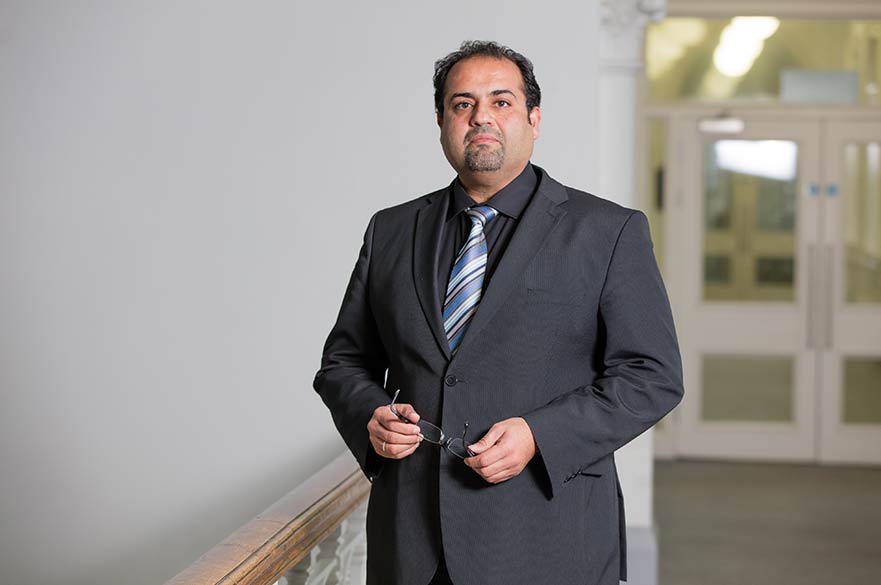Scanners to spot hidden knives and reduce unnecessary police searches
Scanning technology for police to use through mobile phones could lower the number of knives on the street and reduce unnecessary stop and searches of innocent people.
By Chris Birkle | Published on 4 April 2019
Categories: Press office; School of Architecture, Design and the Built Environment;

Scanning technology for police to use through mobile phones could lower the number of knives on the street and reduce unnecessary stop and searches of innocent people.
Researchers at Nottingham Trent University and Loughborough University are using ordinary cameras combined with electromagnetic infrared waves and a unique computer algorithm to detect weapons hidden beneath clothing.
Initial tests by the researchers show that the technology can detect concealed knives from up to six metres away - through clothing including trousers and heavy coats, and those hidden under belts - but does not show any private body parts.
The universities are among six projects to have received a share of more than £460,000 funding from the Home Office and Department for Transport, provided through a Defence and Security Accelerator (DASA) competition, to fast-track innovative technologies to detect people carrying knives in crowded places such as streets, railway stations and major events.
Professor Amin Al-Habaibeh, an expert in intelligent engineering systems from Nottingham Trent University, said: “Knife crime is a growing problem in the UK, but this technology will enable police to spot concealed weapons from a distance which are hidden under clothing, allowing officers to apprehend those who may be about to commit a serious offence.
“At the same time – by providing police with improved intelligence – it will reduce the number of unnecessary stop and searches which take place, allowing innocent people to go freely about their business.
“Our design is extremely cost-effective as it is based on existing technologies and ultimately could be made available through every day mobile phones.”

Dr Ashraf El-Hamalawi, of Loughborough University, added: “I’m really pleased to receive the funding and look forward to developing the technology further.
“Many people are suffering as result of knife crime, and it seems more people have started to carry knives without thinking of the consequences.
“This technology may act as a deterrent and aid with knife crime detection, and maybe it has the potential to save lives."
The research is also being undertaken with Loughborough University Research Associate Maxime Lohya.
The other proposals that received DASA funding are from Security Screening Technologies Ltd, Iconal Technology Limited, Xenint Ltd, Thales UK, Advanced Nano Tech and Scientific Ltd.
All six projects will be asked to demonstrate their findings this summer. The focus is on technology that is safe, easy to operate, unobtrusive and suitable for indoor and outdoor use, and the work is being supported by the National Police Chiefs’ Council.
If the projects perform to the desired level, the Home Office will work closely with the police to assess how these products could be used on the front line.
The DASA competition announcement was made on Monday (April 1), when the Prime Minister hosted the Serious Youth Violence summit in Downing Street.
Following the news, Minister for Crime, Safeguarding and Vulnerability Victoria Atkins said: “Recent senseless killings that have snatched young lives away have shocked people across the UK.
“We are determined to protect families from these devastating crimes, and new technology must play a key role in this, together with effective early intervention work and strong law enforcement.
“I’m pleased the Government has been able to support these exciting and innovative projects which have the potential to rid our streets of dangerous weapons.”
Transport Minister Andrew Jones added: “The safety of passengers is absolutely paramount, and we are committed to tackling the scourge of knife crime.
“I’ve seen first-hand this week the exceptional work groups such as the British Transport Police are doing to tackle this issue, but more needs to be done.
“That’s why this funding is so important – it will help us identify ways in which technology can detect concealed knives, helping us keep people safe on our railways.”
Notes for Editors
Press enquiries please contact Chris Birkle, Public Relations Manager, on telephone +44 (0)115 848 2310, or via email.
Nottingham Trent University was named University of the Year 2017 at the Times Higher Education Awards and Modern University of the Year in The Times and Sunday Times Good University Guide 2018. The award recognises NTU for its strong student satisfaction, quality of teaching, overall student experience and engagement with employers.
Nottingham Trent University (NTU) has been awarded the highest, gold, rating in the Government’s Teaching Excellence Framework for its outstanding teaching and learning.
NTU is one of the largest UK universities with nearly 28,000 students and more than 3,500 staff across four campuses, contributing £496m to the UK economy every year. It is one of the most environmentally-friendly universities, containing some of the country’s most inspiring and efficient award-winning buildings.
The University is passionate about creating opportunities and its extensive outreach programme is designed to enable Nottingham Trent to be a vehicle for social mobility. NTU is the sixth biggest recruiter of students from disadvantaged backgrounds in the country and 95.6% of its graduates go on to employment or further education within six months of leaving.
NTU is home to world-class research, winning The Queen’s Anniversary Prize in 2015 - the highest national honour for a UK university. It recognised the University’s pioneering projects to improve weapons and explosives detection in luggage, enable safer production of powdered infant formula and combat food fraud.
With an international student population of approximately 2,600 from around 100 countries, the University prides itself on its global outlook.